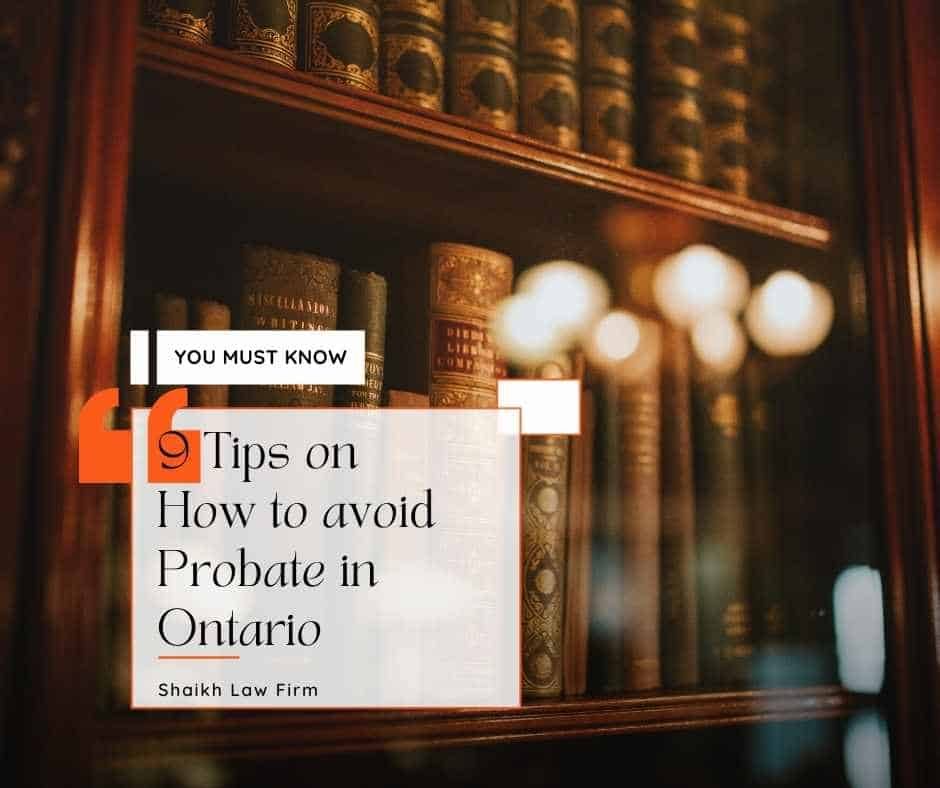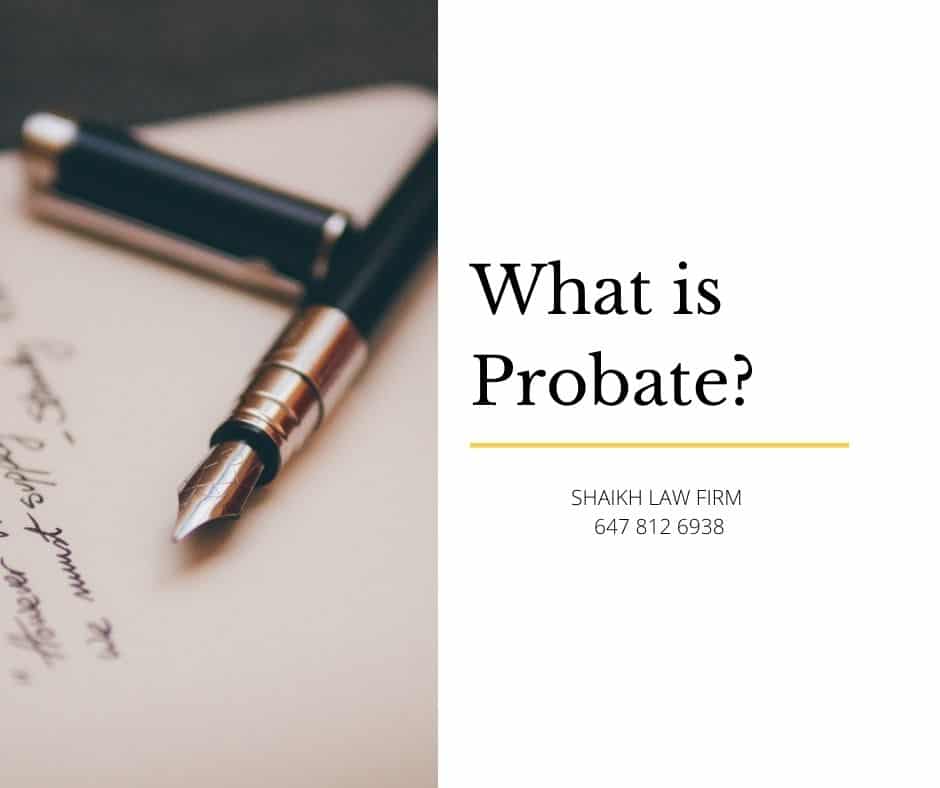In order to understand how to avoid probate in Ontario, we need to first and foremost understand what it is and when it’s required.
Once you understand that, then knowing how to avoid probate in Ontario isn’t all that difficult, especially when you know which steps to take. This article explains in detail how you can do just that


Probate is a legal process where the court formally approves the Will as the last and valid Will of the deceased and confirms the authority of the person named in the Will as the estate trustee. If there is no Will, then by way of probate, the court appoints the estate trustee of an estate.
Upon completing the probate process, the court will issue a Certificate Appointment of Estate Trustee. Upon appointment, the estate trustee has the legal authority to deal with the deceased’s estate.
Supreme Court of Canada defined the purpose of probate in the case of Re Eurig Estate [1998] S.C.J. No. 72
” The purposes of probate is to certifiy that a will and codicils have been duly proved and registered in the court and that the administration of the property of the deceased has been committed by the court to the person named in the will as executor”

It is the nature of assets and potential objections against the executor which will determine whether probate is needed
Once you name beneficiaries on all of your life insurance policies then life insurance will be paid directly to the beneficiaries, which means the funds will never be a part of the probate estate. This, in turn, means that they will not be subject to any probate fees or taxes. It’s always a good idea to name a secondary beneficiary as well, in case the primary beneficiary passes away before you.
As a word of warning, we are increasingly noticing that insurance companies are building a practice to demand probate of a Will to release proceeds to an estate despite the named beneficiary. This practice is questionable and in the case of Rozon Estate v. Transamerica Life Insurance Co. of Canada, [1999] O.J. No. 4538 the court held that “There was nothing in the Insurance Act that should lead the Court to interpret the words sufficient evidence in section 203 to mean necessarily a probated will.”
In other words, the Insurance Act only requires sufficient evidence of death to pay the proceeds to the beneficiaries but sufficient evidence did not automatically mean a will has to be probated.
When assets like stock are held in cash/bearer certificates, they can be excluded from the probate estate. This automatically reduces any associated taxes and fees. A bearer certificate is a kind of financial instrument (check payable via ‘cash’, for example) that can be redeemed by the individual or party possessing it.
Again as a word of warning, many stock transfer agents insist upon receiving an indemnity bond to transfer corporate shares without probate. It would be wise to check with your broker before you make this part of your estate plan.
All assets held in a designated beneficiary account do not require to be probated. Most common designated beneficiary assets accounts are life insurance, registered saving plans such as RRSPs, RRIFs, TFSAs, and employer pension plan. They are also referred as ‘Transfer on Death’ or ‘Pay on Death’ assets.
Since a ‘Transfer on Death’ or ‘Pay on Death’ is not applicable for non-registered investment accounts, you must have a registered account such as a TFSA, RRSP or RRIF account where you have named beneficiaries. However, you can avoid probate on non-registered accounts through joint ownership.
A ‘Transfer on Death’ or ‘Pay on Death’ designation on the joint ownership account lets you determine who the property will be transferred to or to whom the amount will be paid to, according to what you’ve put down in your will.
Since this will be transferred directly to the chosen party, no probate taxes will be levied.
In order to designate a ‘Transfer on Death’ or ‘Pay on Death’ to a beneficiary, you must contact the investment firm or bank where the account was originally opened.
The general procedure may vary from bank to bank or firm to firm, but in most cases, you’re required to fill out and return a form, and that’s it.
The institution prior to payment may insist on a copy of the last will, and some form of proof to verify that there are no subsequent Will or change of beneficiaries.
Assets possessed jointly with rights of survivorship in place pass directly to the living joint owner, which means they will never be subject to probate. This strategy is particularly effective for co-owned real estate, as it ensures a seamless transfer of property to the surviving owner.
Additionally, for properties in Ontario, consider the First Dealings Exemption as part of your estate strategy. This exemption can be applied to properties being transferred for the first time under the Land Titles system, having previously been registered under the old Registry system. Utilizing this exemption allows the property to bypass the probate process entirely, saving potential probate fees and expediting the transfer process. This is particularly advantageous for high-value properties.
However, it’s a good idea to consider some key aspects before you name a joint owner for any of your assets, because it’s not always the best thing to do in all circumstances:
If you gift your property to a close family friend, or anyone, really, it will effectively reduce the estate’s value at the time of your passing. This means that the amount of taxes or any fees due will also be reduced. However, certain legal obligations may apply when giving gifts during your lifetime that are given away specifically to reduce probate taxes. Consider the following:
By setting up a trust fund, you’re effectively attaching a title to your property, which will be held by a designated trustee for you. However, you can also appoint yourself as a trustee. After your demise, the trust will handle the distribution of the property and since they (the trust) are the sole owner, the property will never become a part of your probate estate, and therefore, won’t be subject to any probate taxes.
As long as you have a payable debt which is not a mortgage, it will not be deducted from your assets at the time of your death when the value of the estate is being determined. Since the value of the estate will go up, a higher probate tax will be applicable.
Therefore, you must transfer the loan and the asset purchased along with it to a limited company, effectively reducing the estate’s gross value. In turn, this will cut down the probate tax payable.
The use of dual Wills method to avoid probate in Ontario if not reduce probate tax and fees.
Any party holding certain kinds of assets can make two wills. The Primary Will deals with assets that are subject to probate while the Secondary Will deals with how the assets are to be distributed. This way, you can effectively cut down your probate. To understand what these asset classes are, speak to an experienced estate lawyer or probate lawyer.
For example, a huge addition of cash can put you in another tax bracket, and you may end up paying more income tax.
The above steps are all very effective when we talk about ‘how to avoid probate in Ontario’.
It is equally important to speak to a professional who is experienced in dealing with estate planning matters. Consulting an estate lawyer and speaking to your tax consultant will go a long way to help you plan on how to avoid probate.
In order to exercise better control over when a beneficiary is handed down the property, you should seriously consider creating a trust or a private limited company.
It’s also a good idea to sit down with your friends and family, and discuss how you’d like for your personal property to be distributed amongst the beneficiaries after your demise.
For instance, if you want a specific a friend or family member to have a certain item, and you’re not sure if your wishes will be faithfully acted upon, then it’s best to simply hand over the item during your lifetime.
Also, a word of caution: When you name a joint account holder on any account, the joint owner can take out all the cash at any time they wish or even cause a lien to be placed on that account – often a direct result of being sued where a judgement is handed down against them.
Therefore, you should play it safe by naming a Transfer on death instead, which will ensure that the property passes down to the rightful heir, without surrendering any interest in it until after your demise.
Just to quickly reiterate – it’s imperative that you work with a qualified estate lawyer or probate lawyer to understand your financial and legal rights as well as obligations, before you take any action whatsoever.
The Tips discussed in this article can be very effective in terms of ‘how to avoid probate in Ontario’, but it must be understood that outright avoiding probate may not be the best course of action for everyone.
Consulting an estate lawyer or a probate lawyer ensures that you’re taking the appropriate steps to avoid probate according to your specific circumstances, or whether you should even consider avoiding probate to begin with.
There’s no question about the fact that avoiding probate can save you plenty of time and money.
Some of the tips explained above may be easier than others – however, a simple miscalculation or misstep can cause many problems down the line.
This is precisely why people work with a Estate lwayer or probate lawyer in Ontario for expert estate planning as well as to avoid the hefty fees, filing demands and long delays which are often a part of how probate works in Ontario.
At the end of the day, we simply want to ensure that we pass down the desired assets, property, cash, bank account or prized items to our family and loved ones after our demise.
After an entire life of hard work and saving for retirement, the absolute last thing you want to deal with is the Canadian government demanding a large portion of your hard-earning livelihood in the shape of probate fees.
Shaikh Law Firm are based in Ontario, offering completely straightforward, transparent and unbiased advice on how to avoid probate in Ontario.
Our experienced and knowledgeable lawyers in Ontario will sit down with you to fully understand your situation, and then come up with strategies to help you reduce probate and eliminate it altogether, where possible.

(905) 795 7757
info@slclawyer.ca
(905) 795 1271
Get Free 15 Minutes Phone Consultation